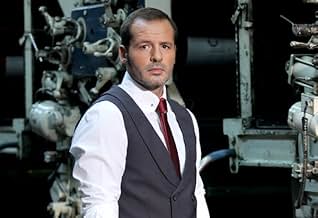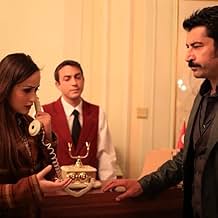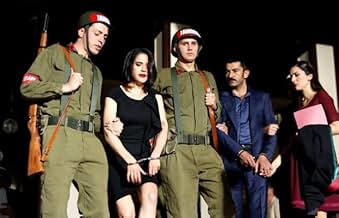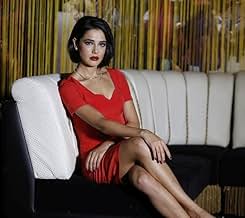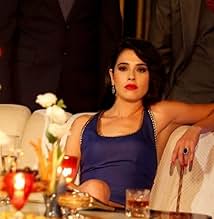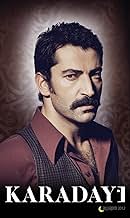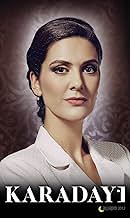IMDb RATING
7.7/10
6.2K
YOUR RATING
The Kara family's life is turned upside down because of a wrongful accusation that results in the imprisonment of Nazif Kara for a murder he didn't commit.The Kara family's life is turned upside down because of a wrongful accusation that results in the imprisonment of Nazif Kara for a murder he didn't commit.The Kara family's life is turned upside down because of a wrongful accusation that results in the imprisonment of Nazif Kara for a murder he didn't commit.
- Awards
- 18 wins & 9 nominations
Browse episodes
Storyline
Did you know
- TriviaKaradayi was awarded Best Drama TV Series at 40th Golden Butterfly Awards in 2013.
Featured review
I feel a duty to share my feelings about Karadayı. I watched this series dubbed in Persian split in 350 episodes. I feel a close cultural background with this story especially the timeframe of its events in the 1970s. As a whole, the series look quite different in texture from almost every other series or movie I have ever watched in my life. It is very real. I am not a critique, but I am going to share what I could absorb from Karadayı:
1. I admire the great play by Kenan İmirzalıoğlu, Bergüzar Korel, Çetin Tekindor, Yurdaer Okur, and virtually all the cast. I can't point out any particular actor/actress. They are a team of professionals in one place. Kenan, for instance, can express a broad spectrum of feelings on his face. He can mimic, let's say, 15 shades of happiness, 16 shades of sadness, 17 shades of anger, combinations of them, as well as diverse shades of indifference, astonishing, and virtually any feeling in its right context without any exaggeration. In his extreme anger, Kenan can momentarily get a little bit hopeful and happy; and then resume to his previous level of anger. For example, anytime after getting good news about his father, Nazif, who he holds him in high regards, his face blows into cheers and happiness. I have never been able to feel the life as vivid as Kenan feels it!. He should be a gifted actor whose face muscles are richly innervated. Kenan has been excelling in his roles compared to his plays in the previous series. Same thing with Bergüzar. She can love you now and despise you next minute. She can be so flirting in this scene and so serious in the next scene. They both can cry anytime they want. Other main characters are also great players. I should also congratulate the Persian dubbers. They conveyed passion, love, kindness, anger, and every other feeling through their voices. You could easily tell when the character was determined or hesitant just by listening to their voices. Kenan has enjoyed many dubbers in his other series such as Ezel, but Mr. Nader Keymaram has done an extraordinarily superior dubbing job for Kenan in this series.
2. The directorship is simply GREAT! The way the scenes relate to each other and the story timeline is put together entices you to be impatient to watch the following scene or the next episode. I couldn't sleep enough just to watch it continuously, even 15 episodes in a row sometimes. Although the story could still be trimmed easily, the prolonged story is not a big deal, especially when moral lessons fill in the conversations.
The series depict a story that seems very real. I noticed some less real or less logical parts throughout the story, but they are infrequent and pleasantly forgivable. These less real scenes are just symbolic, used to narrate the message of the story, and don't affect the beauty of the whole thing.
There is a high fidelity in expressing the time of day (using dusk, the moon, and the newspaper boy) and time of year (using people's clothing, green plants, winter trees, snow, and people discussing weather).
3. The camera does a professional job. The camera captures the scenes virtually from any angle regardless the location, either a small room, on the street, on a hill, etc. The camera is just salient in three dimensions. It can move fast focusing in or out, descending or ascending based on the stress level of the scene. It can suddenly start to swirl vertically or horizontally if needed. It showed Mahir once he was sitting on his bed in the jail, leaning to wall behind, drown in his thoughts and banging his head slightly, slowly, and repeatedly to the wall. The camera, showing him from his side 90 degrees turned, as if he is banging is head to the ground, to entrain your empathy with his deep sorrow. The camera does a lot of subtle tricks in every episode. I wish I were a cinema critic to pick all its tricks. But the ones I can notice, help me to feel the fragrance of the scenes better. The light helps the camera to emphasize the feelings of the characters much better.
4. The music is from a great Turkish composer, Toygar Işıklı. I didn't know him before, but I am addicted to some soundtracks such as Ateşe Yürümek, Ölüme Gülümse (İdam Sehpası), Elimi Tut, and Benden Kaçış Yok (Turgut). I should appreciate his choices of the old songs including but not limited to Sensiz Saadet Neymiş (by Yaşar Güvenir), Kıskanıyorum (by İnci Çayırlı), Unutama Beni (by Esmeray), Geri Dönülmez Bir Yoldayım (by Neşe Karaböcek), Sensiz Kaldığım Geceler (by Şecaattin Tanyerli)
In summary, Karadayı is the best series I've ever watched. I laughed and cried with the characters. I was just stuck to the chair, hungry to watch next episodes. I wish it never ended. I will watch it again next summer.
1. I admire the great play by Kenan İmirzalıoğlu, Bergüzar Korel, Çetin Tekindor, Yurdaer Okur, and virtually all the cast. I can't point out any particular actor/actress. They are a team of professionals in one place. Kenan, for instance, can express a broad spectrum of feelings on his face. He can mimic, let's say, 15 shades of happiness, 16 shades of sadness, 17 shades of anger, combinations of them, as well as diverse shades of indifference, astonishing, and virtually any feeling in its right context without any exaggeration. In his extreme anger, Kenan can momentarily get a little bit hopeful and happy; and then resume to his previous level of anger. For example, anytime after getting good news about his father, Nazif, who he holds him in high regards, his face blows into cheers and happiness. I have never been able to feel the life as vivid as Kenan feels it!. He should be a gifted actor whose face muscles are richly innervated. Kenan has been excelling in his roles compared to his plays in the previous series. Same thing with Bergüzar. She can love you now and despise you next minute. She can be so flirting in this scene and so serious in the next scene. They both can cry anytime they want. Other main characters are also great players. I should also congratulate the Persian dubbers. They conveyed passion, love, kindness, anger, and every other feeling through their voices. You could easily tell when the character was determined or hesitant just by listening to their voices. Kenan has enjoyed many dubbers in his other series such as Ezel, but Mr. Nader Keymaram has done an extraordinarily superior dubbing job for Kenan in this series.
2. The directorship is simply GREAT! The way the scenes relate to each other and the story timeline is put together entices you to be impatient to watch the following scene or the next episode. I couldn't sleep enough just to watch it continuously, even 15 episodes in a row sometimes. Although the story could still be trimmed easily, the prolonged story is not a big deal, especially when moral lessons fill in the conversations.
The series depict a story that seems very real. I noticed some less real or less logical parts throughout the story, but they are infrequent and pleasantly forgivable. These less real scenes are just symbolic, used to narrate the message of the story, and don't affect the beauty of the whole thing.
There is a high fidelity in expressing the time of day (using dusk, the moon, and the newspaper boy) and time of year (using people's clothing, green plants, winter trees, snow, and people discussing weather).
3. The camera does a professional job. The camera captures the scenes virtually from any angle regardless the location, either a small room, on the street, on a hill, etc. The camera is just salient in three dimensions. It can move fast focusing in or out, descending or ascending based on the stress level of the scene. It can suddenly start to swirl vertically or horizontally if needed. It showed Mahir once he was sitting on his bed in the jail, leaning to wall behind, drown in his thoughts and banging his head slightly, slowly, and repeatedly to the wall. The camera, showing him from his side 90 degrees turned, as if he is banging is head to the ground, to entrain your empathy with his deep sorrow. The camera does a lot of subtle tricks in every episode. I wish I were a cinema critic to pick all its tricks. But the ones I can notice, help me to feel the fragrance of the scenes better. The light helps the camera to emphasize the feelings of the characters much better.
4. The music is from a great Turkish composer, Toygar Işıklı. I didn't know him before, but I am addicted to some soundtracks such as Ateşe Yürümek, Ölüme Gülümse (İdam Sehpası), Elimi Tut, and Benden Kaçış Yok (Turgut). I should appreciate his choices of the old songs including but not limited to Sensiz Saadet Neymiş (by Yaşar Güvenir), Kıskanıyorum (by İnci Çayırlı), Unutama Beni (by Esmeray), Geri Dönülmez Bir Yoldayım (by Neşe Karaböcek), Sensiz Kaldığım Geceler (by Şecaattin Tanyerli)
In summary, Karadayı is the best series I've ever watched. I laughed and cried with the characters. I was just stuck to the chair, hungry to watch next episodes. I wish it never ended. I will watch it again next summer.
- EimanRahimi
- Jul 27, 2015
- Permalink
- How many seasons does Karadayi have?Powered by Alexa
Details
- Release date
- Country of origin
- Official sites
- Language
- Also known as
- Ena Weldek Ya Baba
- Filming locations
- Istanbul, Turkey(location)
- Production company
- See more company credits at IMDbPro
Contribute to this page
Suggest an edit or add missing content


